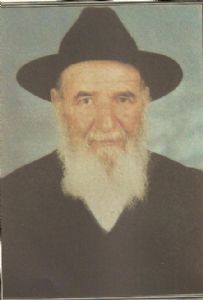A Short Tribute
Hacham Avraham Dahan was born to Issa and Rabbi Meir on 8 Tevet, 5675 (1915) in the village of Assamar, in the Atlas mountains of Morocco. The Dahan family goes back to King David, as indicated by their original name, Adahan (Hebrew acronym of "I am King David the anointed"). In 1929, at the age of 14, Hacham Avraham Dahan traveled to the big city of Marrakesh to study with Hacham Machluf Abuhazeira and other scholars. He trained in ritual slaughter and circumcision with Hacham Abuhazeira.
In 1935, at the age of 20, Hacham Avraham Dahan married Sa'ada Azrad, who died without bearing any children. He married Zohara, his first wife's sister, at the age of 32.
Hacham Avraham Dahan served as a shochet and mohel, He had a pleasant voice, and was also a cantor and read the Torah. He refused payment for fulfilling these commandments and earned a living as a teacher, traveling by foot from village to village in the region in which he lived. With time, he was appointed rabbi of Assamar, his hometown.
In 1956 Hacham Avraham Dahan had his entire community immigrate to Israel. Despite the fact that some of them scattered and settled in different places, he made sure to maintain the links between the families and continued to lead them in Israel as he had in Morocco.
Hacham Avraham Dahan settled in the Mle'ah moshav , located in in the Ta'anach region, south of the town of Afula. He served as rabbi of Gadish and Nir Yaffe, adjacent villages, as well. He undertook the responsibility of child education and had a school established to meet local families' needs. As rabbi of the moshav, he participated in the community's physical labor, planting trees and digging ditches for the Jewish National Fund.
Hacham Avraham Dahan lived to a ripe old age and passed away on 5 Cheshvan 5769 (2009). His community named their synagogue Maguen Avraham after him. Hacham Avraham Dahan wrote several works, but his only published book was Zichronot Avraham, containing his original Torah commentary and sermons.
